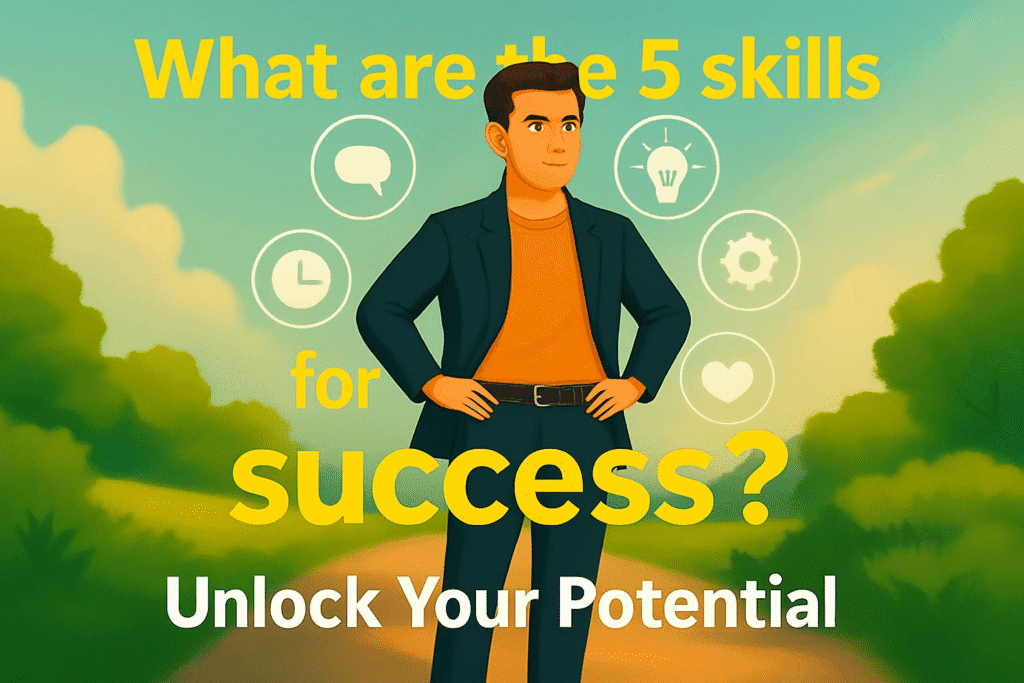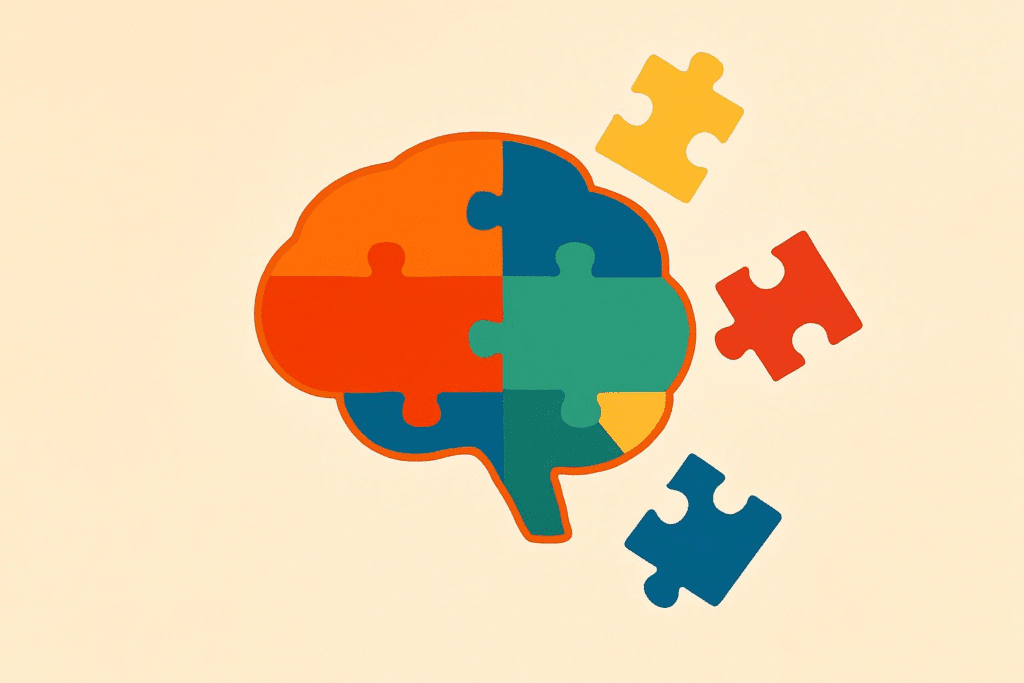Introduction

Success means something different to each of us—yet it’s a pursuit we all share. For some, it’s climbing the professional ladder. For others, it’s about leading a meaningful life, nurturing relationships, or feeling fulfilled in their own skin. But no matter how you define success, here’s the truth: it doesn’t just happen. It’s not luck. It’s not a gift. It’s a result—crafted through intentional effort and the right set of skills.
Skills are the true currency of progress. They’re what transform ambition into action and dreams into deliverables. Whether it’s communicating with clarity, thinking critically, adapting to change, or capitalizing on the moment—these are the abilities that separate those who get by from those who get ahead. In today’s fast-moving world, it’s no longer just about working hard; it’s about working smart, with the tools that give you a competitive edge.
Out of all the capabilities that fuel personal and professional growth, there are five that consistently rise to the top. These five core skills are game-changers—the kind that unlock doors, build confidence, and set the foundation for a life of momentum and meaning. In this article, we’re going beyond the basics. You’ll learn what these skills are, why they matter, and exactly how to start building them—starting today.
Let’s get into it—and uncover the skill set that could redefine your path forward.
The 5 Skill for Success

If you’re aiming for real success—whether it’s in your career, relationships, or personal growth—there’s one truth you can’t ignore: success isn’t handed to you. It’s built. And the building blocks? They’re the skills you develop along the way. These aren’t just tools for getting by—they’re what allow you to overcome obstacles, lead with confidence, and tap into your highest potential.
Let’s dive into five essential skills that form the bedrock of lasting success, and explore not just what they are, but why they matter and how you can actively build them into your everyday life.
1. Communication: The Power to Connect and Influence
At the heart of every strong relationship, team, or leadership role lies one essential skill: communication. It’s more than just speaking or writing—it’s how you connect, inspire, and make yourself understood.
Why it matters: Clear, confident communication reduces misunderstandings, builds trust, and helps you share your vision with impact.
Master this by:
- Practicing active listening—focus on truly hearing others, not just responding.
- Improving public speaking—even in casual settings, the ability to speak with confidence makes a difference.
- Sharpening your written communication—every email, message, or post is a reflection of your clarity and professionalism.
2. Critical Thinking & Problem-Solving: Your Mental Toolkit for Progress
Life throws challenges. Success comes from how you respond. Critical thinking gives you the power to assess situations rationally, while problem-solving fuels your ability to take decisive, effective action.
Why it matters: These skills help you cut through noise, think independently, and make decisions that move you forward—especially under pressure.
Master this by:
- Asking better questions—challenge the obvious and dig deeper.
- Practicing decision-making tools like SWOT analysis or pros/cons lists.
- Engaging in strategy games or brain teasers to boost mental agility.
3. Adaptability & Resilience: Thriving Through Change
In a fast-changing world, the ability to pivot and push through tough times is priceless. Adaptability keeps you relevant. Resilience keeps you going when things get hard.
Why it matters: You’ll face setbacks—it’s inevitable. These traits let you bounce back stronger and turn uncertainty into opportunity.
Master this by:
- Taking on new challenges that stretch your comfort zone.
- Reflecting on failures not as dead ends, but as lessons.
- Practicing mindfulness to stay grounded and composed in high-stress moments.
4. Emotional Intelligence (EQ): The Silent Advantage
EQ is your ability to recognize and manage emotions—both your own and others’. It’s a powerful, often overlooked skill that determines how well you lead, collaborate, and resolve conflict.
Why it matters: Strong EQ creates deeper connections, smoother teamwork, and better outcomes in every human interaction.
Master this by:
- Building self-awareness through journaling or self-reflection.
- Practicing empathy by listening without judgment.
- Asking for honest feedback on how you come across emotionally—and adjusting thoughtfully.
5. Time Management: Controlling the Clock Before It Controls You
Time is your most limited resource—and managing it well is the difference between stress and success. Great time management isn’t about cramming more in—it’s about focusing on what truly matters.
Why it matters: Prioritizing your time means more progress, less burnout, and better quality in everything you do.
Master this by:
- Using the Eisenhower Matrix to focus on high-impact tasks.
- Scheduling your day with time blocks to protect deep work.
- Cutting out time-wasters that drain focus without adding value.
The Bottom Line
You don’t stumble into success—you build it with intention, one skill at a time. These five core abilities—communication, critical thinking, adaptability, emotional intelligence, and time management—aren’t just “nice to have.” They are your launchpad for creating a life of meaning, momentum, and impact.
Start practicing them today—not just to reach your goals, but to transform the kind of person you become while getting there.
Why These Skills Matter

Success isn’t a stroke of luck—it’s the result of intentional growth and a powerful set of skills that shape how you show up in every area of life. Whether you’re chasing personal fulfillment or career excellence, there are five core abilities that consistently set high achievers apart: communication, critical thinking, adaptability, emotional intelligence, and time management. These aren’t just useful—they’re foundational. Here’s why mastering them changes everything:
1. They Help You Build Real, Lasting Relationships
Effective communication and emotional intelligence aren’t just about expressing yourself—they’re about understanding others deeply. These skills let you earn trust, resolve conflict, and create meaningful connections, whether you’re leading a team, collaborating with peers, or nurturing personal relationships.
2. They Strengthen Your Ability to Solve the Right Problems, the Right Way
Critical thinking is your superpower when facing uncertainty or complexity. It trains you to pause, assess the situation objectively, and approach challenges with clarity and confidence—turning potential roadblocks into opportunities for innovation.
3. They Turn Uncertainty into Opportunity
In today’s fast-evolving world, adaptability and resilience are your survival kit. They give you the flexibility to shift gears when life throws curveballs and the mental strength to bounce back stronger from setbacks. Change stops being a threat and becomes a catalyst for growth.
4. They Unlock Peak Productivity Without the Burnout
Time management isn’t about doing more—it’s about doing what matters most. When you know how to prioritize, eliminate distractions, and set boundaries, you gain control over your day, reduce stress, and make room for both achievement and self-care.
5. They Lay the Groundwork for a Future You’re Proud Of
These five skills aren’t just tools for today—they’re investments in your future. Together, they give you the confidence and capacity to grow in any environment, embrace new challenges, and turn potential into long-term progress.
How to Develop These Skills
Skills are not fixed traits—they evolve with focused effort, practice, and a mindset geared toward growth. Strengthening the five essential skills for success—communication, critical thinking, adaptability, emotional intelligence, and time management—means taking intentional steps and staying committed to continuous development. Here’s how you can effectively build each one:
- Communication Skills
How to Cultivate:
- Practice active listening by giving your full attention, withholding judgment, and responding with curiosity.
- Join public speaking groups or discussion clubs to enhance verbal expression and confidence.
- Write consistently, whether through journaling or blogging, to refine your ability to communicate clearly in writing.
Tools to Use: - Use Grammarly to polish grammar and tone in digital communication.
- Read books like How to Win Friends and Influence People by Dale Carnegie for practical strategies to connect with others.
- Critical Thinking and Problem-Solving
How to Cultivate:
- Question your assumptions regularly and explore problems from multiple angles.
- Study decision-making frameworks like SWOT or the Fishbone Diagram to add structure to your analysis.
- Play strategy-based games or puzzles to boost logic and reasoning skills.
Tools to Use: - Try apps like Brainscape for reinforcing knowledge through repetition.
- Read Thinking, Fast and Slow by Daniel Kahneman to gain deeper insight into how the mind processes decisions.
- Adaptability and Resilience
How to Cultivate:
- Push your boundaries by seeking out new experiences and embracing discomfort.
- Develop a mindfulness routine to stay grounded during uncertainty and change.
- Reflect on past challenges and extract lessons that can guide you through future adversity.
Tools to Use: - Use apps like Headspace to practice guided meditation and manage stress.
- Read The Obstacle Is the Way by Ryan Holiday to reframe setbacks as opportunities for growth.
- Emotional Intelligence (EQ)
How to Cultivate:
- Spend time in self-reflection to recognize emotional patterns and their impact on your actions.
- Cultivate empathy by listening without judgment and genuinely seeking to understand others.
- Take part in group activities or leadership roles to improve collaboration and emotional awareness.
Tools to Use: - Explore EQ assessments like the Emotional Intelligence Appraisal for feedback and self-awareness.
- Read Emotional Intelligence 2.0 by Travis Bradberry and Jean Greaves for actionable strategies.
- Time Management
How to Cultivate:
- Start each day by identifying high-impact tasks using methods like the Eisenhower Matrix.
- Block off focused time periods for specific activities and limit distractions during these sessions.
- Review your daily routine to pinpoint where time is wasted and make adjustments.
Tools to Use: - Leverage tools like Trello or Asana to break large goals into manageable tasks.
- Read The 7 Habits of Highly Effective People by Stephen R. Covey to build lasting productivity habits.
Consistency is what transforms practice into progress. When you approach skill-building with discipline and a learner’s mindset, these abilities become second nature—guiding you toward meaningful, lasting success in every area of your life.
Conclusion
Success isn’t just about having big dreams—it’s about having the right skills to turn those dreams into reality. The five essential skills for success—communication, critical thinking, adaptability, emotional intelligence, and time management—form the foundation that supports your growth through every stage of life.
These aren’t just professional assets; they’re life-enriching abilities that help you connect with others, make sound decisions, stay flexible in uncertain times, understand emotions, and make the most of every hour in your day. Whether you’re navigating a career shift, building relationships, or pursuing personal goals, these skills give you the clarity, resilience, and focus needed to move forward with purpose.
The good news is, these skills aren’t reserved for a select few. They can be built, improved, and mastered—if you’re willing to put in the effort. With consistency, reflection, and a mindset geared toward growth, you’ll begin to notice real changes in how you handle challenges and pursue opportunities.
Success is a process of becoming—not just achieving—and these five skills are your toolkit for that transformation. Commit to your development, take deliberate steps every day, and you’ll begin to see your life shift in powerful, meaningful ways.
Recommended Resources on Amazon
Enhance your journey toward success with these carefully selected tools and resources available on Amazon. Each product is designed to help you develop the 5 essential skills for success:
How to Win Friends and Influence People by Dale Carnegi
The Art of Thinking Clearly by Rolf Dobelli
Thinking, Fast and Slow by Daniel Kahneman
FAQ’s
Can these skills be learned or are they innate?
These skills are not innate—they can be developed and refined over time with deliberate effort. For example, communication skills can be improved through practice, and emotional intelligence can be nurtured by developing self-awareness and empathy. Consistency and willingness to learn are key to mastering these abilities.
Which skill is the most important for success?
The importance of each skill depends on your goals and the context in which you apply them. For example, communication is crucial for relationship-building, while critical thinking is essential for decision-making. However, emotional intelligence often stands out as a pivotal skill since it impacts how you interact with others and handle challenges.
How can I measure my progress in developing these skills?
Track your growth by setting milestones and regularly evaluating your performance. For example:
Monitor improvements in communication through feedback from peers.
Test your critical thinking by tackling complex problems and reflecting on the solutions you’ve created.
Assess time management by reviewing completed tasks against deadlines.
Are these skills relevant across all industries and professions?
Absolutely. These 5 skills are universally valuable and apply to every industry and profession. Whether you’re a teacher, engineer, entrepreneur, or artist, these abilities enable you to excel in any field by fostering collaboration, problem-solving, adaptability, and efficiency
What resources can help me improve these skills?
Here are some tools and resources:
Apps: Tools like Grammarly (communication), Headspace (resilience), and Trello (time management) are helpful.
Books: Titles such as Emotional Intelligence 2.0 and Thinking, Fast and Slow provide practical insights.
Courses: Platforms like Coursera and Udemy offer workshops on communication, critical thinking, and other key areas.
